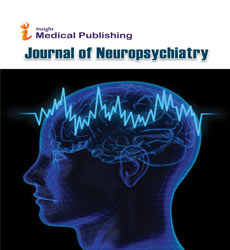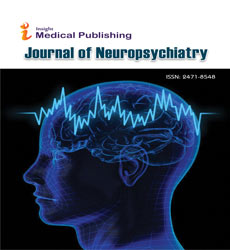Editorial on Neuropsychiatric Disorders
Louise Smith*
Department of Psychological Medicine, King's College London, London, UK
- *Corresponding Author:
- Louise Smith
Department of Psychological Medicine
King's College London
London, UK
E-mail: Louise.smith@gmail.com
Received Date: October 14, 2021; Accepted Date: October 22, 2021; Published Date: October 29, 2021
Citation: Smith L (2021) Editorial on Neuropsychiatric Disorders. J Neuropsychiatry Vol.5 No.2:e001
Description
Neuropsychiatric disorders are major causes of global disease burden, typically co-occurring with several co-morbidities, particularly obesity, type 2 diabetes, non-alcoholic fatty liver disease, and the metabolic syndrome's different risk factors. While the mechanisms that cause neuropsychiatric diseases are complicated. Neuropsychiatric disorder is a broad word that refers to a variety of medical diseases involving both neurology and psychology. TBI, infections, medication side effects, Attention Deficit Hyperactivity Disorder (ADHD), genetic susceptibility, and environmental factors are some of the most common causes. In some cases, the reason is unknown or linked to other circumstances. Schizophrenia (SZ), Bipolar Disorder (BD), Major Depressive Disorder (MDD), and attention deficit Hyperactivity Disorder (ADHD) are all prevalent but severely debilitating neuropsychiatric disorders. Despite the fact that they are thought to reflect variations in brain function, they are not accompanied by obvious neuropathology, and the biological mechanisms underlying them are largely unknown. It is known, however, that the majority of neuropsychiatric disorders are at least partially heritable, and it has long been hoped that the discovery of susceptibility genes will provide much-needed insight into their molecular aetiology, potentially leading to more effective treatments. Treatments that work Technological advances in genome analysis, along with huge sample sizes, have resulted in considerable advances in our understanding of the genetic architecture of major neuropsychiatric disorders and the genetic loci involved in these disorders over the last decade. The fact that symptoms of neuropsychiatric disorders affect brain function, emotion, and mood is a significant feature.
These symptoms can range from irritability, sadness, memory problems, mood problems, depression, and a variety of other psychiatric and/or neurological symptoms in the case of ADHD to sadness, irritability, memory problems, mood problems, depression, and a variety of other psychiatric and/or neurological symptoms. With the help of psychiatric drugs, many people begin to feel better. The most appropriate psychiatric drugs are determined by the symptoms being experienced. The following drugs can be used to treat neuropsychiatric disorders: Antidepressants: These drugs help to relieve depression and anxiety symptoms. Psychostimulants, often known as stimulants, boost concentration by increasing activity in the frontal lobe of the brain. Cholinergic medication: These drugs make brain cells (neurons) work more efficiently, which helps with memory problems. Mood stabilisers: These drugs help to control mood swings. Mood stabilisers, for example, may help to reduce the severity of episodes of excitability (mania). Antipsychotic medicines: Antipsychotic medications can help control psychotic symptoms, which are frequently caused by abnormal moods. Sleep aids: To help with sleep problems, drugs such as beta blockers may be prescribed. Not only medication neuropsychiatric disorders can also be reduced by following a proper diet. There are 2 different diets that are suggested by a dietician.
Mediterranean Diet: The Mediterranean diet has been shown to lower the risk of Alzheimer's disease, dementia, heart disease, and stroke. The Mediterranean diet takes its cues from the lifestyles and dining options of countries bordering the Mediterranean Sea. According to studies, this diet extends life, enhances brain and eye function, and even aids in the treatment of rheumatoid arthritis. It emphasises eating largely plant-based foods such as fruits and vegetables, whole grains, seeds, nuts, and beans, olive oil as the major source of fat, moderate amounts of fish, and even small amounts of red meat such as chicken. The MIND Diet has been shown to reduce the risk of dementia and Alzheimer's disease. The Mediterranean diet and the DASH (Dietary Approaches to Stop Hypertension) diet are combined in the MIND diet. Mediterranean-DASH Intervention for Neurodegenerative Delay (MIND) is an acronym for Mediterranean-DASH Intervention for Neurodegenerative Delay. Because high blood pressure is linked to dementia, the MIND diet emphasises foods that can help lower blood pressure, such as kale and spinach, as well as all other vegetables and beans, berries (blueberry, raspberry, and blackberry), whole grains like oatmeal, quinoa, and brown rice, and calcium-rich foods like low-fat and non-fat dairy.

Open Access Journals
- Aquaculture & Veterinary Science
- Chemistry & Chemical Sciences
- Clinical Sciences
- Engineering
- General Science
- Genetics & Molecular Biology
- Health Care & Nursing
- Immunology & Microbiology
- Materials Science
- Mathematics & Physics
- Medical Sciences
- Neurology & Psychiatry
- Oncology & Cancer Science
- Pharmaceutical Sciences
